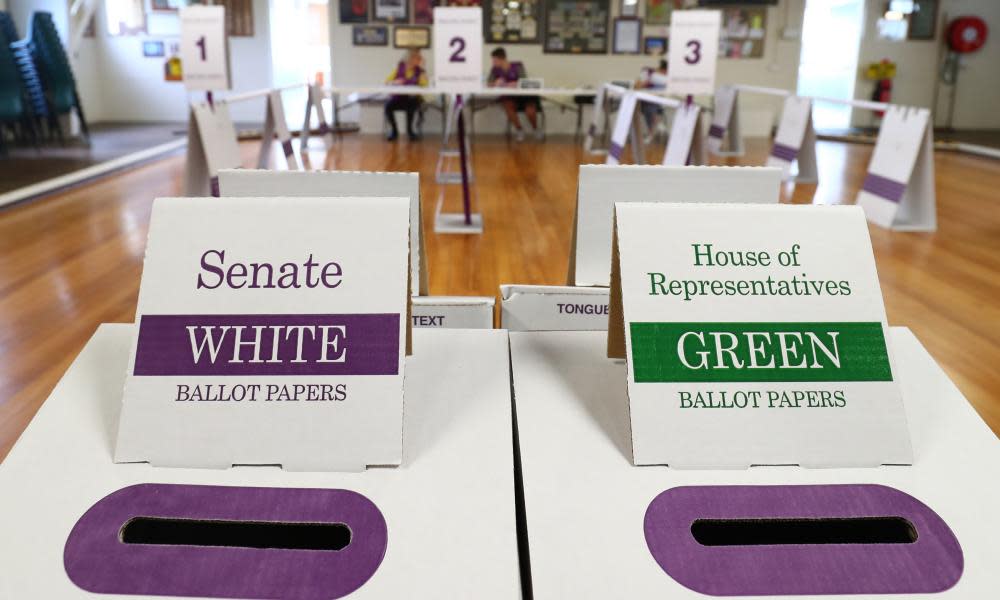Proposed voter ID laws ‘real threat’ to rights of Indigenous Australians and people without homes

Proposed laws that would require eligible voters to show identification before casting a ballot could disenfranchise Indigenous Australians and people experiencing homelessness, advocates have warned.
On Tuesday Guardian Australia revealed the Morrison government will shortly introduce voter identification legislation to crack down on alleged voter fraud.
Labor and the Greens launched stinging rebukes, accusing the government in Senate estimates of pandering to racist constituents and importing US-style voter suppression into Australia.
Related: Australian minor parties revolt against new rules that could bar up to 30 from next election
Under the proposed voter integrity bill, yet to be introduced to parliament, a voter unable to produce ID can still vote if their identity can be verified by another voter, or by casting a declaration vote, which requires further details such as date of birth and a signature.
But opponents warn eligible voters in vulnerable groups may be discouraged or excluded from voting.
Kate Colvin, the national spokesperson for the Everybody’s Home campaign, said the bill was “a deeply concerning development because it compounds the exclusion felt by people without homes, adding another hurdle to participation in community life”.
“Housing stress and the risk of homelessness confronts ever larger numbers of Australians, especially as we navigate another irrational housing boom,” she said.
“Governments should respond with greater support, not disenfranchising people and taking away basic rights of citizenship.”
Homelessness Australia chair, Jenny Smith, said people without homes “often feel unheard, excluded and that they matter less than others. Voting is one way in which they can be heard.”
“If you flee your home without your papers to escape violence, or have your documents stolen while sleeping on the street, you shouldn’t lose your ability to vote.
“Research commissioned by the AEC explicitly calls out ID requirements as an area of concern for participation in elections for people without homes.”
In September the Australian Human Rights Commission made a submission to a Senate inquiry recommending that One Nation’s separate voter ID bill be blocked, warning it would “create a barrier for people who lack identification documents from exercising their right to vote, leading to further disenfranchisement”.
The AHRC noted Mick Gooda, the former Aboriginal and Torres Strait Islander social justice commissioner, had opposed a similar law proposed for Queensland in 2014. He said that Aboriginal and Torres Strait Islander people attempting to vote “may feel intimidated by the requirements to fill in extra paperwork and being treated differently to other voters”.
“I worry that intending voters may not continue to complete their ballot if required to go through the declaration vote procedure,” Gooda told a Queensland inquiry at that time.
The AHRC submitted that “Aboriginal and Torres Strait Islander peoples often do not possess a birth certificate and face difficulties obtaining subsequent formal identification”.
According to the Australian Electoral Commission, only 78% of Indigenous voters were enrolled to vote in 2020.
The AHRC said this was “a much more significant issue than the very low rates of multiple voting”.
“It is vital to avoid steps that would impede the progress made to increase rates of Indigenous participation in our elections.”
On Wednesday GetUp’s First Nations justice campaign director, Larissa Baldwin, said “these punitive voter ID laws will see First Nations people turned away from voting on election day just because they don’t have the right identification documents”.
“Australia has a dark, racist history of denying First Nations people the vote, and these proposed laws are a very real threat to the right to vote for people living on country,” she said in a statement.
“There’s a two-tier voting system in Australia right now – and it’s unacceptable.”
The government majority on the joint standing committee on electoral matters has recommended voter ID laws in reviews of the last two federal elections.
In Senate estimates on Tuesday evening, the Australian electoral commissioner Tom Rogers said that “evidence of multiple voting to date is vanishingly small” but acknowledged there was a “perception issue that other people think is worth dealing with”.
Rogers said its “policy is not to have a policy” because voter ID is “a political issue” that should be determined by parliament.
The finance minister, Simon Birmingham, defended the government’s proposal as a means to “further enhance integrity” and public confidence by eliminating “actual areas of risk and perceived areas of risk” such as multiple voting or fraudulent voting in the name of deceased people.
In estimates the Labor senator, Tim Ayres, accused the government of introducing legislation to “throw the racist reactionary right a bone” labelling it an “utter disgrace”.
Ayres said that some voters will “go home” if they were asked to fill out a declaration vote which is “probably the design” of the bill.
“We have a system we should be very proud of – why we would want to insert US segregationist Jim Crowe legislation to corrupt the Australian ballot process, I have no idea.”
Greens senator Larissa Waters said voter ID laws were “a solution in search of a problem” with just 19 verified instances of double voting at the last election.
“There is zero credible evidence that election outcomes are being corrupted by voter fraud,” she said in a statement.
Given One Nation’s support for voter ID laws, the Coalition will need just one vote of the remaining crossbench senators – Stirling Griff, Rex Patrick and Jacqui Lambie – to pass the bill.
Patrick told Guardian Australia he had “no great interest in engaging with the government” on the voter ID bill unless it legislated the Helen Haines model of a national integrity commission.
A spokesperson for the special minister for state, Ben Morton, said he would have more to say in “coming days”.

 Yahoo Movies
Yahoo Movies 
